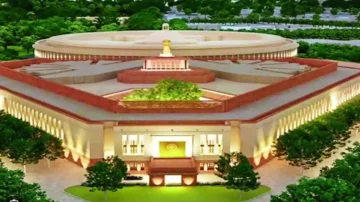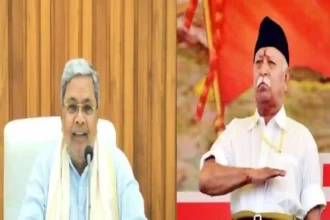
In recent years, India’s digital and political landscape has seen a dramatic transformation. With social media platforms like X (formerly Twitter), Facebook, and WhatsApp becoming political battlegrounds, a new lexicon of slang terms has emerged. Among these, three particularly provocative terms have gained popularity: “Kanglus”, “Kangladesh”, and “Khangress”.
These words, while not part of any official political glossary, have become powerful tools in the hands of online trolls, influencers, and even anonymous meme pages. But what do these terms actually mean? Where did they come from? And what do they signify in the broader context of Indian nationalism and politics?
- What Is the Meaning of ‘Kanglus’, ‘Kangladesh’, and ‘Khangress’?
- How ‘Kanglus’ Became an Online Slur for Bangladeshis
- Kangladesh: A Code Word for Bangladesh in Online Trolling
- Khangress: A Party Nicknamed for ‘Appeasement’
- Social Media and the Weaponization of Political Slang
- Illegal Immigration vs. Hate Narratives
- Why These Terms Are Controversial and Dangerous
- Is There a Real Demographic Shift in Bengal and Assam?
- Kanglu Memes and Digital Hindutva: A Cultural Trend
- Free Speech, Trolling, and the Cost of Online Radicalization
- What This Means for India’s Electoral Politics
- Final Thoughts
What Is the Meaning of ‘Kanglus’, ‘Kangladesh’, and ‘Khangress’?
The term “Kanglus” is a slang expression used online to refer derogatorily to Bangladeshis, particularly those accused of illegally migrating into India. It is most often used to describe Bangladeshi Muslims, and it’s frequently deployed in narratives alleging demographic shifts in Indian states like West Bengal and Assam.
“Kangladesh”, on the other hand, is a sarcastic label for Bangladesh itself, or more often, for Indian regions where critics claim Bangladeshi influence has become dominant—implying those areas are no longer truly Indian. This includes West Bengal, parts of Assam, and certain urban localities in Delhi or Hyderabad.
“Khangress” is a distorted spelling of Congress, India’s oldest political party. It is used mockingly by right-wing social media users to suggest that the Congress party is subservient to minority interests or foreign influence—often accused of appeasing Kanglus (Bangladeshis) for vote-bank politics.
All three terms—Kanglus, Kangladesh, and Khangress—are steeped in communal undertones, xenophobia, and partisan propaganda.
How ‘Kanglus’ Became an Online Slur for Bangladeshis
The rise of the term “Kanglus” coincides with increased discussions around illegal immigration from Bangladesh into India, especially after the NRC (National Register of Citizens) exercise in Assam and the proposed CAA (Citizenship Amendment Act).
Those who oppose illegal immigration, particularly Hindu nationalist groups, often claim that successive governments—especially Khangress and TMC (Trinamool Congress)—have allowed illegal immigrants to settle for vote-bank politics. These immigrants are then pejoratively labeled “Kanglus,” implying both criminality and disloyalty to India.
The term is also weaponized during riots, demographic discussions, and communal violence, often trending alongside hashtags like #BangladeshiInvasion, #DeportKamglus or #StopIllegalImmigrants.
Kangladesh: A Code Word for Bangladesh in Online Trolling
The term “Kangladesh” is widely used in right-wing digital circles as a mocking reference to Bangladesh — particularly in the context of illegal immigration into India.
Rather than referring to Indian states like West Bengal or Kerala, the term directly targets Bangladesh as a country, portraying it as a source of demographic and cultural infiltration. It’s often used alongside other slurs like “Kanglus” (for Bangladeshis) and “Khangress” (mocking the Congress party) to suggest that certain Indian political actors are aligned with Bangladeshi or foreign interests.
The narrative goes like this: by allowing illegal Bangladeshi migrants into India for vote-bank politics, parties like Khangress are allegedly turning India into a proxy state of Kangladesh.
This slang is not just about migration—it’s also about identity, nationalism, and suspicion of any cultural or political sympathy toward Bangladesh. It plays on fear and nationalism, often trending during border-related incidents, communal violence, or elections.
Khangress: A Party Nicknamed for ‘Appeasement’
The term Khangress reflects a broader critique of the Congress party by right-wing commentators. It accuses the party of being overly sympathetic to illegal immigrants (Kanglus) and minority voters. The nickname is often used to:
Undermine the credibility of Congress policies
Associate the party with foreign loyalties
Reinforce the idea that Congress does not represent the Hindu majority
It is part of a larger campaign to erode the legitimacy of opposition parties through digital branding and ridicule.
Social Media and the Weaponization of Political Slang
In Indian political discourse, social media has become a battleground of weaponized slang — terms used not to debate, but to demean, polarize, and provoke.
The Left and liberal circles coined terms like “Bhakt” and “Andhbhakt” to criticize perceived blind supporters of Narendra Modi and the BJP.
In retaliation, the Right-wing digital ecosystem has unleashed its own vocabulary: “Kanglu,” “Kangladesh,” and “Khangress.”
These terms are not neutral descriptors. Instead, they serve as rhetorical tools used by meme pages, troll accounts, and ideological influencers to:
🔹 Brand political rivals (especially Congress and TMC) as traitors or sympathizers of foreigners
🔹 Mock Bangladeshi immigrants, often calling them “Kanglus” in a derogatory tone
🔹 Accuse political parties of Muslim appeasement, especially in states like West Bengal, Kerala, and parts of Delhi
🔹 Stoke anti-Muslim and anti-immigrant sentiment during elections or communal tensions
At the heart of these terms lies a majoritarian narrative: that India is being culturally, politically, or demographically threatened — not by foreign invasions, but by “internal enemies” and “outsiders” allegedly protected by liberal parties.
These slangs aren’t about truth, but about mobilizing anger, sharpening identity divides, and creating digital echo chambers. The frequency with which they trend — especially around elections, CAA-NRC debates, or communal flashpoints — reveals how deeply entrenched digital propaganda has become in India’s democratic process.
Illegal Immigration vs. Hate Narratives
It’s crucial to separate genuine concerns about illegal immigration from hate-fueled propaganda. While illegal migration from Bangladesh is a legitimate national issue, especially in Assam and West Bengal, the narrative surrounding “Kanglus” often generalizes and vilifies entire communities.
The danger is that such language:
Dehumanizes genuine refugees or poor migrants
Incites violence and mob attacks
Radicalizes youth on digital platforms
Silences secular or liberal voices
Why These Terms Are Controversial and Dangerous
Critics argue that terms like “Kanglu” and “Khangress” are digital dog-whistles. They may seem like satire, but their intent is often to invoke fear and promote communal hatred. By blurring the line between an illegal immigrant and an Indian citizen of Muslim faith, these terms play a dangerous game of identity erasure.
Moreover, equating entire regions to “Kangladesh” mocks not just demographic changes, but also regional cultures, democratic outcomes, and constitutional values.
Is There a Real Demographic Shift in Bengal and Assam?
Government and independent studies have shown significant migration from Bangladesh to India over decades. However, not all of it is illegal or religiously motivated. Many came during Partition, 1971 Liberation War, or for economic survival.
Claims that entire regions have become Islamic or Bangladeshi in identity often lack empirical backing and are used more as campaign rhetoric than factual analysis.
Kanglu Memes and Digital Hindutva: A Cultural Trend
Troll memes about Kanglus, Kangladesh, and Khangress often go viral during:
Election cycles
Religious festivals (especially Ram Navami, Muharram)
Riots or communal violence
Government policy debates (like CAA-NRC)
These memes blend humor with hate, making them highly shareable and emotionally charged, especially among young, digital-savvy nationalist audiences.
Free Speech, Trolling, and the Cost of Online Radicalization
While satire and political humor are essential in a democracy, the dehumanization of communities through terms like ‘Kanglu’, ‘Khangress’, and ‘Kangladesh’ crosses ethical boundaries. It contributes to echo chambers, widens India’s social rift, and creates an “us vs. them” mentality that’s hard to reverse.
The challenge is balancing free speech with digital accountability, ensuring that terms which encourage xenophobia or hate aren’t normalized as just “internet culture.”
What This Means for India’s Electoral Politics
With 2026 and 2029 Lok Sabha elections in view, the use of divisive slang will likely increase. Terms like “Kanglus,” “Khangress,” and “Kangladesh” will continue to be used to demonize voters, delegitimize opposition wins, and frame a nationalist vs. secular narrative.
Media, political leaders, and civil society must question and resist such tactics if India is to maintain its democratic pluralism.
Final Thoughts
The rise of terms like “Kanglus,” “Khangress,” and “Kangladesh” is not just about online trolling — it’s a reflection of the polarized, hyper-nationalist politics shaping India’s future. Recognizing the intent behind these words is the first step toward pushing back against digital hate and protecting the integrity of public discourse.
What does “Kanglu” mean in Indian political slang?
“Kanglu” is a derogatory slang term used by some right-wing internet users to mock Bangladeshis or illegal immigrants. It is often deployed online to paint certain communities as outsiders or infiltrators.
What is “Kangladesh” and how is it used?
“Kangladesh” is a sarcastic and politically charged term used by Indian social media users—especially from nationalist or right-wing circles—to mock Bangladesh and Bangladeshi immigrants. It implies that Bangladeshis (referred to as “Kanglus”) are infiltrating Indian society and politics, particularly in regions like West Bengal and Assam. The term is often used to criticize perceived appeasement politics, demographic shifts, and illegal immigration.
What does “Khangress” refer to?
“Khangress” is a mocking term for the Indian National Congress party, used by right-wing supporters to question its policies, patriotism, or stance on illegal immigration. It’s part of a broader effort to delegitimize the opposition.
Who uses these terms — Kanglu, Kangladesh, Khangress?
These terms are mostly used by right-wing troll accounts, meme pages, and some social media influencers. They’re meant to stir public opinion, ridicule political rivals, and push ideological narratives online.
Are terms like “Kanglu” or “Khangress” considered hate speech?
While not officially classified as hate speech, such terms are often criticized for being xenophobic, communal, or misleading. They contribute to online polarization and reduce the space for constructive political dialogue.
Why do political slang terms trend during elections in India?
Terms like “Kanglu”, “Bhakt”, or “Urban Naxal” often go viral during elections or communal incidents. They help mobilize digital supporters, distract from real issues, and frame opponents in a specific ideological light.

















